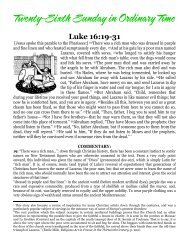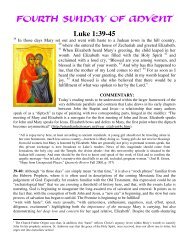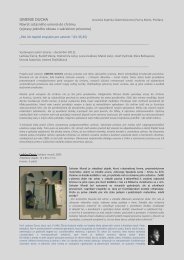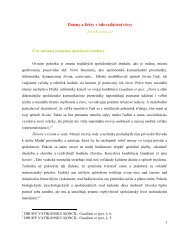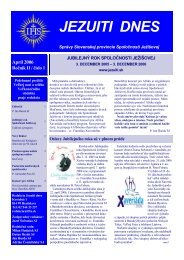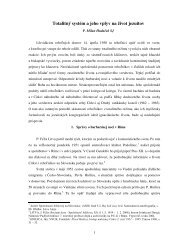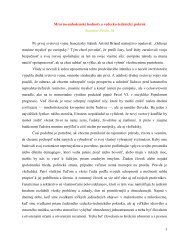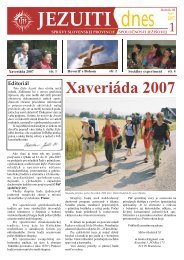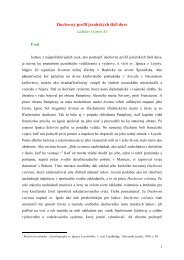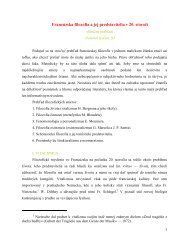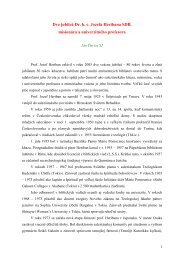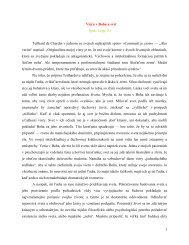Luke 24:46-53 - Jezuiti
Luke 24:46-53 - Jezuiti
Luke 24:46-53 - Jezuiti
You also want an ePaper? Increase the reach of your titles
YUMPU automatically turns print PDFs into web optimized ePapers that Google loves.
(celebrated in Canada this Sunday, and on the previous Thursday in the U.S.A.)<br />
<strong>Luke</strong> <strong>24</strong>:<strong>46</strong>-<strong>53</strong><br />
<strong>46</strong>Jesus said to his disciples: ‘Thus it is written, that the Messiah 1 is<br />
to suffer and to rise from the dead on the third day, 47and that<br />
repentance and forgiveness of sins is to be proclaimed in his name to<br />
all nations, beginning from Jerusalem. 48You are witnesses of these<br />
things. 49And see, I am sending upon you what my Father promised;<br />
so stay here in the city until you have been clothed with power from<br />
on high.’ 50 Then he led them out as far as Bethany, and, lifting up<br />
his hands, he blessed them. 51While he was blessing them, he<br />
withdrew from them and was carried up into heaven. 52And they<br />
worshipped him, and returned to Jerusalem with great joy; <strong>53</strong>and<br />
they were continually in the temple blessing God.<br />
COMMENTARY:<br />
<strong>Luke</strong> is the only one of the four evangelists who specifically describes the Ascension 2 , although the fairly<br />
sparse description here (basically just v. 51) 3 needs to be read in conjunction with our First Reading, the<br />
longer and more detailed account given at the start of the Acts of the Apostles (since both books are<br />
<strong>Luke</strong>’s compositions). That second, longer re-telling is equally part of <strong>Luke</strong>’s presentation of this key<br />
moment in the transition between the Risen Jesus’s earthly presence and the ministry of the Spirit-guided<br />
Church.<br />
<strong>46</strong>-47: A person could search the Old Testament for a lifetime, and yet you would never find an exact<br />
quotation that is quite as explicit and clear-cut as the way in which Jesus cites it in today’s Gospel.<br />
Although there certainly are Old Testament texts which speak of the suffering of various righteous<br />
persons and groups (including the unnamed “Servant of the Lord” in Isaiah)—and although there are texts<br />
which speak of new life and some type of “revival” or divine saving action [on the third day] 4 , nevertheless<br />
the Biblical witness is not as simple and straightforward as we might assume from Jesus’ words here.<br />
1 or “the Christ”: Christ is a transliteration of the Greek, whereas Messiah is the transliteration of the underlying<br />
Hebrew word from which the Greek is taken; both words have the same meaning: “the Anointed One”.<br />
2 The “longer ending” of Mark contains a description of the Ascension, although it is widely considered today to be a<br />
later addition to the Second Gospel, and not to be the original ending composed by Mark.<br />
3 “<strong>Luke</strong> … lays little stress on the actual ascent at this point. His concern is with the disciples and their relationship to<br />
Jesus” (I.H. Marshall, The Gospel of <strong>Luke</strong>: A Commentary on the Greek Text, p. 909).<br />
4 E.g. Isaiah 49:6; <strong>53</strong>:7-8; Psalm 16:10; Hosea 6:3, the book of Jonah, Joel 2:32, etc.
There certainly were a variety of messianic ideas circulating in first-century Judaism, although it seems<br />
that very few (if any) Jews expected a Messiah-figure who would suffer and/or die 5 . Many of the Old<br />
Testament texts which speak of suffering and death do not seem to have been generally considered<br />
“messianic” at that time, and only acquired a messianic interpretation for Christians, in the light of the<br />
events of Christ’s Passion, death and resurrection. We need to remember that <strong>Luke</strong>’s Gospel (like the<br />
entire New Testament) is written in the light of the Church’s experience of the Resurrection. Many things<br />
that were not always clear to Jesus’ original listeners during His lifetime became clearer in the months<br />
and years after Easter, as the first Christians sought to understand these events on the basis of the Jewish<br />
Scriptures. What we are reading in <strong>Luke</strong> is the Church’s remembrance of Jesus’ life and words, seen<br />
through at least one generation of Christian reflection on those events.<br />
Jesus’ words here are pointing the early Christians back to the Jewish Bible, and saying that these<br />
inspired words contain a depth of meaning that was not entirely obvious to the Jews of earlier centuries,<br />
but which have now been revealed to hold something further within them. It is not primarily a case of<br />
searching out the exact wording, but of discovering new and previously unimagined meanings. This is<br />
what specialists mean when they speak of Christian (or Jewish) “hermeneutics” (i.e. the science of<br />
interpretation): the Christian interpretation is one possible way of reading these texts (and Christians<br />
believe that this is deliberate, a meaning intended by God). Obviously, we do not suggest that it is the only<br />
way, although we believe that it is a meaning that has been endorsed and confirmed by the events of<br />
Jesus’ life and is, therefore, an authentic and inspired interpretation. Needless to say, Jews and Christians<br />
view this “Christological interpretation” in quite different ways, and some Jewish scholars see this as a<br />
largely incorrect and misleading hermeneutical avenue. Similarly, Christians must acknowledge that our<br />
interpretation is not the only proper way of reading these Old Testament texts, and that the Jewish<br />
reading is also a legitimate (and extremely important and valuable!) one 6 .<br />
The key point here is that, contrary to many people’s conclusions at the time, the suffering, death and<br />
resurrection of Jesus need not be understood as disproving Jesus’ claims to be the Messiah. In fact, <strong>Luke</strong><br />
is saying, there is a stream within the Old Testament which can be interpreted as prophesying precisely<br />
these sorts of events—although the specific events of Jesus’ Passion and resurrection went beyond even<br />
what could be subtly distilled from the Scriptures. Although the Scriptures can be read in a way that de-<br />
5 One of the more intriguing exceptions to this conclusion seems to be a tradition preserved in an ancient Jewish<br />
commentary on Psalm 90 (verse 15): “Make us glad, according to the days of our affliction…”. This interpretation, cited<br />
by the great medieval scholar Rashi of Troyes, renders this verse: “Make us glad, according to the days of the Messiah”.<br />
According to this line of interpretation, “the days of our affliction [i.e. in which you afflicted us]” should actually be<br />
read “the days of our afflicted one [i.e. the Messiah, who is sometimes spoken of as suffering vicariously for Israel]”.<br />
Pesiqta Rabbati [a collection of homiletic midrash on the Pentateuchal and Prophetic readings] graphically describes<br />
the nature of these sufferings, and relates the Messiah’s voluntary acceptance of these sufferings: “Master of the<br />
Worlds! With gladness in my soul and with joy in my heart I accept it, so that not a single one of Israel should perish;<br />
and not only those who will be alive should be saved in my days, but even the dead who have died from the days of<br />
Adam the first man until now. And not only they, but even the stillborn should be saved in my days; and not only the<br />
stillborn, but even those to whose creation You gave thought but who were not created. This is what I want; this is what<br />
I accept!” (Pes. Rab. 161b, as cited in Raphael Patai, The Messiah Texts, p.112). Strack and Stemberger (Introduction to<br />
the Talmud and Midrash) date the final redaction of Pes. Rab. to the sixth or seventh century, with certain portions<br />
perhaps dating back as far as the mid-third century.<br />
Similarly, a passage in the Babylonian Talmud (tractate Sanhedrin 98a) speaks of the Messiah as a leper, who sits at<br />
the gates of the city (or ‘of Rome,’ in certain editions). These traditions are, however, a tiny drop in a vast ocean of<br />
rabbinic speculation about the Messiah, and are clearly the minority view. It is nearly impossible today to know<br />
whether any of these traditions go back to the era of the historical Jesus.<br />
6 Pontifical Biblical Commission, The Jewish People and Their Sacred Scriptures in the Christian Bible (2002):<br />
“Christians can and ought to admit that the Jewish reading of the Bible is a possible one, in continuity with the Jewish<br />
Sacred Scriptures from the Second Temple period, a reading analogous to the Christian reading which developed in<br />
parallel fashion. Both readings are bound up with the vision of their respective faiths, of which the readings are the<br />
result and expression. Consequently, both are irreducible. On the practical level of exegesis, Christians can,<br />
nonetheless, learn much from Jewish exegesis practised for more than two thousand years, and, in fact, they have<br />
learned much in the course of history” (#22).
legitimizes Jesus, they can also be read in a way that accords with what happened to Him, and which<br />
affirms His identity as God’s Chosen One.<br />
“repentance and forgiveness of sins is to be proclaimed in his name to all nations, beginning from<br />
Jerusalem”: since <strong>Luke</strong> and Acts form two parts of a single story, we should not be surprised that this is<br />
exactly what we will see unfolding in the early chapters of the Acts of the Apostles. Jesus’ followers will<br />
begin their preaching in Jerusalem, emphasizing the need for repentance, and the offer of forgiveness<br />
now available to all through Jesus. As local opposition grows, however, the apostles will begin to turn<br />
further afield, to the Samaritans, the Syrians, and other neighbouring nations, until eventually the Gospel<br />
message will reach the imperial capital of Rome, where Acts ends with Paul under house arrest there.<br />
Jesus’ words are, therefore, proved true, confirming once again His status as a genuine prophet.<br />
“in his name”: it is not simply that the disciples are to proclaim repentance and forgiveness, but that these<br />
are to be proclaimed specifically in Jesus’ name, emphasizing that it is in and through Jesus that God’s<br />
mercy now overflows for humanity in a new and even more radical, total way than ever before. Jesus is to<br />
be the subject and focus of their missionary proclamation.<br />
These words also echo <strong>Luke</strong>’s emphasis on the universal significance of Jesus (“to all nations”), and on<br />
the inclusion of “outsiders” (Gentiles) in the salvation being offered. Jerusalem, however, remains the<br />
starting-point, the “cradle” of the infant Church.<br />
The Bible always envisaged that when God finally acted to fulfill all the promises made to Abraham,<br />
Moses and all the prophets, then the whole world would be brought into the embrace of God’s<br />
saving and healing love. This is what must now happen.<br />
‘Repentance’ and ‘forgiveness of sins’ are not, therefore, simply a matter for the individual, though<br />
they certainly are that. At the heart of being a Christian is the personal turning away from sin, and<br />
celebrating God’s forgiveness, which is, after all, at the heart of the Lord’s Prayer. But these two<br />
words go much wider as well. They are the agenda which can change the world. (Tom Wright, <strong>Luke</strong><br />
for Everyone, p. 301)<br />
48: “you are witnesses to these things”: the apostles have certainly been the witnesses to Jesus’ suffering,<br />
death and resurrection, but are also those who can testify that “these things” have happened exactly as<br />
Jesus foretold. They will now go on to be witnesses of (and participants in) the missionary thrust that will<br />
extend the Christian message throughout Israel, the Mediterranean, and other countries of the East. The<br />
pronoun “you” seems to be emphatic in the Greek here.<br />
In Greek, Jesus speaks here of His followers as µάρτυρες (martyres), a term which means “witnesses” in<br />
Greek 7 , but is also linked to our English word “martyrs”—those who have borne the ultimate “witness” to<br />
their faith, by the offering of their own lives and the shedding of their blood. And, indeed, the ancient<br />
Christian tradition ascribes martyrdom to all of the apostles, who are celebrated liturgically with the red<br />
vestments used for the feasts of those who died for their faith.<br />
49: “I am sending upon you what my Father promised”: once again, we have a subtle but real<br />
presentation of the interpersonal dynamics of the Trinity: Jesus sends the Spirit whom the Father has<br />
promised (literally, “I am sending upon you the promise of my Father”) 8 . The pronoun “I” here seems to<br />
be emphatic in the Greek, stressing Jesus’ role of carrying out the Father’s wishes and acting in the<br />
Father’s name (thus suggesting their equality). Jesus Himself has been sent by the Father (see 4:18,35),<br />
and now He is the one who will send the Spirit in the Father’s name, as the Father’s agent.<br />
“stay here in the city until you have been clothed with power from on high”: there seem to be at least three<br />
points made in this sentence: (1) that there is something particular about Jerusalem (vs. another place)—<br />
it is here that Jesus wishes to confer the Spirit; (2) that the “promise of the Father” consists of some new<br />
7 At the beginning of the Gospel, <strong>Luke</strong> said that he had consulted with “eye-witnesses” (autoptai), a different word from<br />
that used here.<br />
8 Jesus is not specific here about the content of this “promise,” but it is possibly a reference to Joel 2:28.
spiritual power than will come from heaven; (3) that after their “clothing with power,” they are no longer<br />
obliged to remain in Jerusalem (this is suggested by the preposition “until”); in fact, this gift is to mark a<br />
threshold which sends them out in new directions. Jerusalem is to be the starting-point—but not the<br />
ending-point—of their new mission. The expression “from on high” here may be a Jewish style of<br />
euphemism for “from God,” in an effort to avoid unnecessarily speaking God’s name. “Clothed with<br />
power” suggests this spiritual gift being draped over the apostles like a robe, a toga or something similar,<br />
enabling them in new ways, and “covering” them with its protection, like a mantle.<br />
50: “he led them out as far as Bethany”: although there is still some debate about the exact location of the<br />
Biblical Bethany, tradition has long situated it on the crest of the Mount of Olives, opposite Jerusalem.<br />
This was a small town where Jesus apparently had very good friends (Mary, Martha and Lazarus), and<br />
from which His triumphal procession into Jerusalem had begun on Palm Sunday. There has been a<br />
church on this site since the last fourth century, and since Crusader<br />
times, a small octagonal shrine-chapel (see picture at left) has<br />
marked the traditional spot of Jesus’ Ascension (it is now part of a<br />
Muslim property, next to a mosque). Depending on the scholars you<br />
read, the name “Bethany” is understood to mean either “House of<br />
Figs/Dates” or “House of Misery/Poverty/Suffering” 9 .<br />
“he led them out”: some scholars point out that the same verb is<br />
used in the Greek Old Testament (=Septuagint) to describe Moses’<br />
“leading out” of the Israelites in the Exodus, and it is possible that<br />
<strong>Luke</strong> wishes us to see a hint of that here—a new Moses, inaugurating<br />
a new Exodus of sorts, into a new Promised Land. This may be corroborated by the fact that Jesus blesses<br />
His followers immediately before leaving them—just as Moses blessed the children of Israel right before<br />
his death (Deut. 33).<br />
“lifting up his hands, he blessed them”: the raising of one’s hands in a formal blessing is a gesture found in<br />
Jewish liturgy and prayer from very early times. This was how the High Priest blessed the assembled<br />
people in the Temple, and it is still how rabbis and cohanim (modern descendants of the Jewish priestly<br />
caste) offer liturgical blessings today (from which the practice has been inherited in Christian liturgy and<br />
practice).<br />
Blessings were often part of final-departure scenes in Jewish literature 10 (e.g., Gen 27:4; 48:15-16).<br />
This act of blessing is like that of the high priest, Simon, in Sir 50:19-20. With a priestly act, the<br />
risen Christ puts his disciples who are to be involved in mission under the protection of God before<br />
he leaves them. (Charles H. Talbert, Reading <strong>Luke</strong>-Acts in Its Mediterranean Milieu, p. 133)<br />
9 “The name Bethany itself confirms the village’s function as a poor-house of Jerusalem. Jerome’s Onomasticon defines<br />
its meaning as domus adflictionis, ‘house of affliction’. Jerome understood the name to be derived from the Hebrew bet<br />
‘anî, or the identical phrase in Aramaic, bet ‘anyâ, ‘house of the poor’ or ‘house of affliction/poverty’. The Christian<br />
Palestinian and Syriac versions of the New Testament both give the Aramaic version of this name, and confirm<br />
Jerome’s understanding. Unfortunately, modern commentators have rejected Jerome’s explanation, preferring most<br />
often to suggest a derivation from the personal name Anaiah (Neh 8:4 and 10:22) … A derivation from bet hini, ‘house<br />
of figs,’ has been suggested, since the name of the nearby village Bethphage derives from bet phagê, ‘house of unripe<br />
figs’ … It is … unlikely that one of these two neighbouring villages, which experienced exactly the same climate, would<br />
have been named for a difference in its fig crop. The Christian Palestinian and Syriac versions were undoubtedly<br />
correct to render Bethany as bet ‘anyâ, ‘House of the Poor’ … The modern semantic equivalent of bet ‘anyâ,<br />
‘Bethany/bethany,’ is ‘Poorhouse/poorhouse’.” (Brian J. Capper, “The New Covenant in Southern Palestine at the<br />
Arrest of Jesus,” in James Davila, ed., The Dead Sea Scrolls as Background to Postbiblical Judaism and Early<br />
Christianity), p. 110.<br />
10 A similar request for a pre-departure blessing is found in the apocryphal 2 Enoch [=Slavonic Enoch] 56, and the<br />
wording is similar to 1 Enoch (“And I lifted up my hands in righteousness and blessed the Holy and Great One…”; R.H.<br />
Charles edition, #LXXXIV, p. 184).
51: “While he was blessing them, he withdrew from them and was carried up into heaven”: it is while<br />
Jesus blesses His followers that He is taken up into heaven; thus, in some sense, the fact of the Ascension<br />
is itself meant to be seen as bound up with the blessing (and not, therefore, as a curse, a punishment or a<br />
deprivation). The Ascension is meant to be seen as a source of blessing—for, until Jesus ascends, the Holy<br />
Spirit cannot be sent; Jesus’ departure is the necessary prerequisite for the coming of the Spirit, with all of<br />
the rich diversity of gifts the Spirit will bestow in Jesus’ name.<br />
“he withdrew from them”: this Greek verb (διΐστηµι, diïstēmi) is very uncommon in the New<br />
Testament, used only 3x, and only by <strong>Luke</strong> (in Lk 22:59, here, and in Acts 27:28).<br />
“was carried up to heaven”: once again, the use of the passive voice here (“was carried up”) may be a case<br />
of the “divine passive,” in which an action is indirectly attributed to God, without specifically naming Him<br />
(and would therefore mean, “God carried Jesus up to heaven”). The idea of being “carried up to heaven”<br />
while still alive may conjure up the images of Enoch and Elijah, two figures who were “lifted up” to heaven<br />
(Gen. 5:<strong>24</strong>; II Kings 2), and about whom a wealth of Jewish legends developed in the centuries around the<br />
time of Jesus. Both Enoch and Elijah were spoken of as exercising key roles in God’s name, especially with<br />
regard to the coming of the Messianic Era and God’s final judgement of the world.<br />
52: “they worshipped him”: <strong>Luke</strong> seems to suggest that, with the Ascension, there is a new and deepened<br />
awareness of Jesus’ identity and nature, and so the disciples “worship” Him (a term implying physical<br />
prostration, normally reserved for worship of God [and, in Roman culture, the Emperor], and therefore<br />
attributing divine qualities to Jesus). The verb “to worship” (“to bow down”) is used only 3x in <strong>Luke</strong> (here,<br />
and twice in 4:7-8, in the account of the temptations in the desert, where the devil invites Jesus to<br />
worship him). This is thus the only place in the Gospel where Jesus is spoken of as being “worshipped”—<br />
the “Christological high point” of <strong>Luke</strong>, as some scholars describe it.<br />
“[they] returned to Jerusalem with great joy”: the disciples return to Jerusalem, in obedience to Jesus’<br />
command to remain there in anticipation of the Spirit’s coming. Now, however, their return to Jerusalem<br />
(the city of Jesus’ suffering and death) is coloured not by fear or worry, but by joy—joy over what they<br />
have just witnessed, and joy over what they now know to expect. Jerusalem has been changed for them<br />
from a city of unhappy memories, death and defeat to a city of triumph and eager anticipation. Especially<br />
in <strong>Luke</strong>’s Gospel, joy is the natural response of human beings who have experienced God’s action in and<br />
through Jesus.<br />
<strong>53</strong>: “they were continually in the temple blessing God”: despite whatever tensions may have existed<br />
between the first Christian Jews and their rabbinic Jewish counterparts, the majority of the first<br />
Christians in the Holy Land certainly considered themselves “at home” in the Temple, and continued to<br />
pray and worship there, probably for many years (decades?) after the Resurrection and Ascension. Other<br />
historical references inform us that the Jewish-Christian schism was neither as simple nor as immediate<br />
as we might infer from the New Testament.<br />
The image of these disciples being “continually in the temple blessing God” recalls the image of the aged<br />
prophetess Anna, to whom <strong>Luke</strong> introduces us in 2:36-38, and who “never left the temple but worshipped<br />
there with fasting and prayer night and day”. <strong>Luke</strong> emphasizes the importance of the Temple, but also the<br />
virtue of continuous prayer (following upon the personal example of Jesus Himself, who often spent long<br />
periods in prayer). The Temple provides the theological and symbolic bridge between the “old” and the<br />
“new,” and emphasizes the continuity of Christianity with its Jewish foundations; <strong>Luke</strong> is clear that he<br />
does not see Christianity as a “rupture” with Judaism, but as an organic (and logical) outgrowth of the Old<br />
Testament and the teachings of early Judaism.<br />
With the ascension, the Gospel reaches its climax. What began in the temple concludes in the<br />
temple with praise to God, and the path of Jesus now reaches its goal. The programme has been<br />
established for the second volume of <strong>Luke</strong>’s work, in which the church will obey the command of
the risen Jesus, to take the gospel to all the nations. (I.H. Marshall, The Gospel of <strong>Luke</strong>: A<br />
Commentary on the Greek Text, p. 908)<br />
Christologically speaking, the ascension means that Jesus, now enthroned at the Father’s right<br />
hand, has established his universal rule, “far over every principality, ruling force, power or<br />
sovereignty”. He is also “head of the Church, which is his Body” (Eph 1:21-23). The ascended<br />
Christ, far from being absent, fills the whole cosmos in a new way: “The one who went down is none<br />
other than the one who went up above all the heavens to fill all things” (Eph 4:10). From now on, it<br />
is through his Spirit, whom “the Father has promised” (<strong>Luke</strong> <strong>24</strong>:49; Acts 1:4), and whom Jesus,<br />
now “raised to God’s right hand,” has poured out (Acts 2:33) or in “the breaking of the bread” (as in<br />
the Emmaus story, <strong>Luke</strong> <strong>24</strong>:35) that Jesus is present in a new way to his followers. Ecclesially, the<br />
ascension implies that the Church now begins to function as the visible embodiment of Jesus. With<br />
the ascension, the time of the Church begins, marked by the gift of the Spirit and by Christian<br />
response to the Spirit, in service of the reign of God. (“Ascension,” in Michael Glazier and Monika<br />
Hellwig, eds. The Modern Catholic Encyclopedia, pp. 51-52)<br />
Various early manuscripts of the passage have alternative readings for specific words and actions of<br />
the departing Lord. Some scholars see the passage as closely resembling the original ending to<br />
John’s gospel (John 20:19-29) and believe that a simple account has been amplified by<br />
interpolations from John. The author’s purpose was the reiterate the absolute identity of the risen<br />
Christ with the flesh-and-blood Jesus of his earlier narrative. This contrasted with the late 1 st -<br />
century heresy called Docetism, which denied the humanity of Jesus by asserting that his divine<br />
nature descended upon him at this baptism and withdrew before his crucifixion. It is possible that<br />
elements of this heresy had already crept into the teachings of some Christian leaders by the time<br />
<strong>Luke</strong>’s gospel was written in the 80s CE. (Rev. John Shearman; online at:<br />
http://www.seemslikegod.org/Lectionary/YearB_Ascension.htm)<br />
Gerald Darring, “The Perspective of Justice”; online at the Center for Liturgy, St. Louis<br />
University:<br />
We usually think of faith as an attitude of trust and belief on our part; we trust God’s word and believe its<br />
message. The Ascension is perhaps the expression of a different faith: God’s faith in us.<br />
God-become-human could have remained on earth and done everything required for the coming of the<br />
kingdom. Instead, Jesus removed himself physically from the earth, making room for his followers. He trusted<br />
them, he believed in them, he had faith that, once they were filled with the Spirit, they would work effectively<br />
for the coming of the kingdom.<br />
It remains for us to go into the whole world and proclaim the good news to all creation. It is our task to<br />
relieve suffering, to end war, to remove ignorance, to heal wounds, to eliminate divisions, to promote<br />
understanding, to spread love, to cause justice. We must tackle the problems of the world, and Jesus has<br />
stepped aside, so to speak, so as not to get in our way.<br />
Why do you stand here looking up at the skies? Get busy! There is work to do!<br />
St. Cyril of Alexandria, On John’s Gospel 9:<br />
[The reason for Christ’s departure was] his desire to open the way for our ascent to those heavenly places and<br />
to prepare a safe passage for us by making smooth the road that had previously been impassable. For heaven<br />
was then completely inaccessible to us—human foot had never trodden that pure and holy country of the<br />
angels.<br />
It was Christ who first prepared the way for our ascent there. By offering himself to God the Father as the<br />
firstfruits of all who are dead and buried, he gave us a way of entry into heaven and was himself the first<br />
human being the inhabitants of heaven ever saw. The angels in heaven, knowing nothing of the sacred and<br />
profound mystery of the incarnation, were astonished at his coming and almost thrown into confusion by an<br />
event so strange and unheard of. Who is this coming from Edom? they asked; that is, from the earth.
But the Spirit did not leave the heavenly throng ignorant of the wonderful wisdom of God the Father.<br />
Commanding them to open the gates of heaven in honor of the King and Master of the universe, he cried out:<br />
Lift up your gates, you princes, and be lifted up you everlasting doors, that the king of glory may come in.<br />
And so our Lord Jesus Christ has opened up for us a new and living way, as Paul says, not by entering a<br />
sanctuary made with hands, but by entering heaven itself to appear before God on our behalf. For Christ has<br />
not ascended in order to make his own appearance before God the Father. He was, is, and ever will be in the<br />
Father and in the sight of him from whom he receives his being, for he is his Father's unfailing joy.<br />
But now the Word, who had never before been clothed in human nature, has ascended as a man to show<br />
himself in a strange and unfamiliar fashion. And he has done this on our account and in our name, so that<br />
being like us, though with his power as the Son, and hearing the command, Sit at my right hand, as a member<br />
of our race, he might transmit to all of us the glory of being children of God. (English translation by Sister<br />
Edith Barnecut, OSB, in Journey With the Fathers: Commentaries on the Sunday Gospels, Year C)<br />
Rev. Dr. Barbara K. Lundblad (online at: http://www.day1.net):<br />
The Spirit that anointed Jesus now anoints you and me. That’s what Jesus tried to tell his disciples before he<br />
left them. “But you will receive power when the Holy Spirit comes upon you, and you will be my witnesses.” …<br />
Here on this earth, where I left my footprints.<br />
Centuries later Dietrich Bonhoeffer kept the message going. “The body of Christ takes up space on the earth,”<br />
he said. That is, the Body of Christ makes footprints. Bonhoeffer goes on, “A truth, a doctrine, or a religion<br />
need no space for themselves. They are disembodied entities, that is all. But the incarnate Christ needs not<br />
only ears or hearts, but living people who will follow him.”<br />
“Why do you stand looking up into heaven?” Sometimes it’s still easier to look for a pure world up there or out<br />
there, especially if we think of the church as the body of Christ. We see so many blemishes, so many things<br />
wrong. Perhaps you’ve said, “Show me a church where ministers aren’t self-serving, where people aren’t<br />
hypocritical, where love is genuine, and then I’ll become a member.” Well, we’ll wait a long time, for such a<br />
church takes up no space on this earth. Or perhaps such a church lives only in our memories, a time when<br />
disciples believed, when faith could move mountains, when motives were pure.<br />
Annie Dillard writes about such longings in her book Holy the Firm:<br />
“A blur of romance clings to our notion of these people in the Bible—as though of course God should come to<br />
these simple folks, these Sunday School watercolor figures, who are so purely themselves—while we now are<br />
complex and full at heart. We are busy. So, I see now, were they. Who shall ascend into the hill of the Lord?<br />
There is no one but us. There is no one to send nor a pure heart on the face of the earth—but only us, a<br />
generation comforting ourselves with the notion that we have come at an awkward time. But there is no one<br />
but us. There never has been. There are generations which remembered, and generations which forgot; there<br />
has never been a generation of whole men and women who lived well for even one day.”<br />
There is no one but us, not in this time and space. We can stand looking up into heaven or we can believe the<br />
promise of Jesus: “But you will receive power when the Holy Spirit comes upon you and you will be my<br />
witnesses.” You will make footprints in and through ordinary, imperfect communities of faith that seldom get<br />
it right. Ascension Day is not a call to look up. It is to trust that Christ’s promise is down and in and around<br />
us. We are not alone—you and I who dance and climb, who run and get knocked down, we who lie on the grass<br />
or sit watching the late-night news. We are not alone. The Holy Spirit, promised by Jesus, surprises us at every<br />
turn, saying, “Guess who?”<br />
Rev. Hubert Beck (online at: http://www.predigten.uni-goettingen.de):<br />
On the one hand, Jesus had finished all that he had been called to do and yet, at the same time, what he had<br />
done was only the beginning of what he would continue to do through these disciples gathered before him and<br />
through all those who would come after them as bearers of the glad tidings.<br />
His ascension, therefore, is not so much to be looked upon or spoken of as an act of levitation, defying the laws<br />
of gravity, to be admired and wondered at, as it is an “elevation of status” before the eyes of all humanity.<br />
Witness was given to those watching that this Jesus with whom they had walked and talked, eaten and drunk,<br />
had been exalted to the divine throne, “seated at God’s right hand in the heavenly places,” recognized as the
head of all things visible and invisible, far above all the creation within which he had lived and died and rose<br />
again from the dead. The “cloud that took him out of their sight” is a rather common biblical way of speaking<br />
about the presence of God (“a pillar of cloud” preceded the Israelites out of Egypt – “a cloud” filled the temple<br />
when it was dedicated – “a cloud” came across the Mount of Transfiguration when Jesus was there with his<br />
disciples, etc.). He was received back again into the divine glory that was rightfully his from before his birth! …<br />
In this we find both fear and hope – fear that we can hide no sin from him, can go no place nor do any thing<br />
without his knowing it – and yet hope that wherever sin is discovered the grace of God is also present in all the<br />
abundance we have seen and known in this crucified, risen and ascended One. The fear of God’s wrath is never<br />
without the counterpoint of the promise of God’s mercy for all who seek it, want it with all their heart, “hunger<br />
and thirst after righteousness” (Matt. 5:6) and place all their confidence in the Christ who finished the work<br />
assigned to him while the Good News of that accomplished work continues to be established anew and<br />
proclaimed in every generation to all parts of the world through his body, the church. No sin is so big that<br />
God’s redeeming grace is not still larger for all who seek it and want it . . . and that redeeming grace fills every<br />
nook and cranny of the entire universe! It is to worship and adore this ascended Lord that we gather in this<br />
place on this day and on every Lord’s Day.<br />
Pope St. Gregory the Great (ca. 540-604), Homily 29 on the Gospels:<br />
“The Lord Jesus, after he had spoken to them, was taken up into heaven and sat down at the right hand of<br />
God” (Mark 16:19). He departed once more for the place where He had previously been; He returned, but from<br />
a place where He continued to dwell. Truly, in this moment when He ascended into heaven in His humanity,<br />
He united heaven and earth in His divinity. Beloved brothers [and sisters], what we should pay attention to in<br />
today’s solemnity is the suppression of the decree which condemned us, and of the judgement by which we<br />
were sentenced to corruption. Truly, human nature—to whom these words were addressed: “You are dust, and<br />
to dust you shall return” (Gen 3:19)—this very nature is today raised up to heaven with Christ. And that is<br />
why, my dear brothers [and sisters], we should follow Him with all our heart—follow Him where our faith tells<br />
us He has ascended in His body. Let us flee from the desires which belong to the earth; may none of these<br />
bonds here below be an obstacle to us who have a Father in heaven.<br />
Let us also think about the fact that He who has ascended into heaven full of gentleness will return in a much<br />
more demanding way … That, brothers [and sisters], is what should guide our actions: focus your minds on it<br />
continuously. Even if you are battered back and forth by the affairs of this world, from this day forward, cast<br />
the anchor of your hope in our eternal homeland (Heb 6:19). May your soul seek only the True Light. We have<br />
just heard that the Lord has ascended to heaven; let us seriously consider what we believe. Despite the<br />
weakness of human nature which still holds us here below, may love draw us to follow Him, for we are certain<br />
that Jesus Christ, who has inspired this desire in us, will not disappoint our hope. (My translation from a<br />
French original)
See, the Conqueror Mounts in Triumph<br />
See, the Conqueror mounts in triumph; see the King in royal state,<br />
Riding on the clouds, His chariot, to His heavenly palace gate.<br />
Hark! the choirs of angel voices joyful alleluias sing,<br />
And the portals high are lifted to receive their heavenly King.<br />
While He lifts His hands in blessing, He is parted from His friends<br />
While their eager eyes behold Him, He upon the clouds ascends;<br />
He Who walked with God and pleased Him, preaching truth and doom to come,<br />
He, our Enoch, is translated to His everlasting home.<br />
He has raised our human nature in the clouds to God’s right hand;<br />
There we sit in heavenly places, there with Him in glory stand:<br />
Jesus reigns, adored by angels; man with God is on the throne;<br />
Mighty Lord, in Thine ascension we by faith behold our own.<br />
See Him, Who is gone before us, heavenly mansions to prepare,<br />
See Him, who is ever pleading for us with prevailing prayer,<br />
See Him, Who with sound of trumpet, and with His angelic train,<br />
Summoning the world to judgment, on the clouds will come again.<br />
Raise us up from earth to Heaven, give us wings of faith and love,<br />
Gales of holy aspirations wafting us to realms above;<br />
That, with hearts and minds uplifted, we with Christ our Lord may dwell,<br />
Where He sits enthroned in glory in His heavenly citadel.<br />
(Lyrics by Christopher Wordsworth, 1862)



